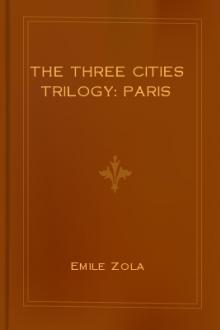author - "Émile Zola"

Description His Masterpiece, sometimes translated as “The Work” or “The Masterpiece,” is Zola’s 14th entry in his Rougon-Macquart series of novels. In it we see Claude Lantier, a painter with obvious talent, struggle to leave a revolutionary mark on the art world of 19th-century Paris. The novel deftly explores the themes of genius, poverty, purity in art, art as a beaurocratic institution, obsession, and madness. The book is notable not just for its accurate portrayal of the art world of the

ocean. However, some footsteps were heard, and Abbe Rose, againmistrustful, saw a man go by, a tall and sturdy man, who wore clogs andwas bareheaded, showing his thick and closely-cut white hair. "Is notthat your brother?" asked the old priest.Pierre had not stirred. "Yes, it is my brother Guillaume," he quietlyresponded. "I have found him again since I have been coming occasionallyto the Sacred Heart. He owns a house close by, where he has been livingfor more than

ing her,he seized hold of her by the arms, shook her violently and sent hersprawling upon the bed of the children, who recommenced crying. And helay down again, mumbling, like a man resolving on something that hepreviously hesitated to do:"You don't know what you've done, Gervaise. You've made a big mistake;you'll see." For an instant the children continued sobbing. Their mother, whoremained bending over the bed, held them both in her embrace, and keptrepeating the same words in a

it a bit," replied Fauchery. "I certainly must make theacquaintance of your Nana before talking about her. Besides, I'vemade no promises."Then to put an end to the discussion, he introduced his cousin, M.Hector de la Faloise, a young man who had come to finish hiseducation in Paris. The manager took the young man's measure at aglance. But Hector returned his scrutiny with deep interest. This,then, was that Bordenave, that showman of the sex who treated womenlike a convict

n ill-greased pulley, and ended by degenerating into a terrible spasm of coughing. The fire basket now clearly lit up his large head, with its scanty white hair and flat, livid face, spotted with bluish patches. He was short, with an enormous neck, projecting calves and heels, and long arms, with massive hands falling to his knees. For the rest, like his horse, which stood immovable, without suffering from the wind, he seemed to be made of stone; he had no appearance of feeling either the cold

Description His Masterpiece, sometimes translated as “The Work” or “The Masterpiece,” is Zola’s 14th entry in his Rougon-Macquart series of novels. In it we see Claude Lantier, a painter with obvious talent, struggle to leave a revolutionary mark on the art world of 19th-century Paris. The novel deftly explores the themes of genius, poverty, purity in art, art as a beaurocratic institution, obsession, and madness. The book is notable not just for its accurate portrayal of the art world of the

ocean. However, some footsteps were heard, and Abbe Rose, againmistrustful, saw a man go by, a tall and sturdy man, who wore clogs andwas bareheaded, showing his thick and closely-cut white hair. "Is notthat your brother?" asked the old priest.Pierre had not stirred. "Yes, it is my brother Guillaume," he quietlyresponded. "I have found him again since I have been coming occasionallyto the Sacred Heart. He owns a house close by, where he has been livingfor more than

ing her,he seized hold of her by the arms, shook her violently and sent hersprawling upon the bed of the children, who recommenced crying. And helay down again, mumbling, like a man resolving on something that hepreviously hesitated to do:"You don't know what you've done, Gervaise. You've made a big mistake;you'll see." For an instant the children continued sobbing. Their mother, whoremained bending over the bed, held them both in her embrace, and keptrepeating the same words in a

it a bit," replied Fauchery. "I certainly must make theacquaintance of your Nana before talking about her. Besides, I'vemade no promises."Then to put an end to the discussion, he introduced his cousin, M.Hector de la Faloise, a young man who had come to finish hiseducation in Paris. The manager took the young man's measure at aglance. But Hector returned his scrutiny with deep interest. This,then, was that Bordenave, that showman of the sex who treated womenlike a convict

n ill-greased pulley, and ended by degenerating into a terrible spasm of coughing. The fire basket now clearly lit up his large head, with its scanty white hair and flat, livid face, spotted with bluish patches. He was short, with an enormous neck, projecting calves and heels, and long arms, with massive hands falling to his knees. For the rest, like his horse, which stood immovable, without suffering from the wind, he seemed to be made of stone; he had no appearance of feeling either the cold